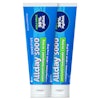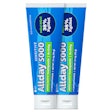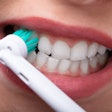Despite not causing enamel hardness loss or adverse effects on mineral content or morphology, there may not be enough evidence to support using vegan toothpaste. This study was published recently in the Journal of Esthetic and Restorative Dentistry.
Furthermore, vegan toothpaste may lead to increased enamel roughness and lack a whitening effect, the authors wrote.
“Toothpastes indicated for vegan individuals are available, but there is little evidence to support their use, in contrast to their widespread marketing,” wrote the authors, led by Reginna Vyctoria da Trindade Souza de Melo Carneiro of the University of Campinas Piracicaba Dental School in Brazil (J Esthet Restor Dent, May 13, 2025).
This study assessed color (ΔE00), the whiteness index (ΔWID), surface hardness loss (SHL), roughness (Ra), mineral content, and morphology of enamel blocks stained with black tea and brushed for 15,000 (T1) and 30,000 (T2) brushing cycles with various vegan and control toothpastes, they wrote.
ΔE00, SHL, and Ra were measured at baseline (T0), T1, and T2, while mineral content and surface morphology were analyzed at T2. Toothbrushing was simulated using a brushing simulator with toothpaste slurries and artificial saliva (AS), mimicking 18 and 36 months of brushing.
The tested vegan toothpastes included:
- Colgate Total 12 Clean Mint (CT)
- A turmeric, clove, and tea tree extract-containing product (CC)
- A chamomile, melissa, and grape extract toothpaste (CA)
- A formula with peppermint and turmeric extracts (CH)
- Colgate Zero Mint (ZM)
- Colgate Zero Peppermint (ZH)
- Mint Everest (ME)
- A charcoal and mint toothpaste (CM)
- Herbal Anis mint and tea tree toothpaste (HA)
At T1, there were no significant differences in ΔE00 or SHL among the groups (p > 0.05). By T2, ZM, ZH, ME, and CM showed greater ΔE00 values than the control AS; CC had the highest SHL, and Ra increased for all groups (p < 0.05). At both T1 and T2, all toothpastes produced negative ΔWID values without affecting enamel mineral content or surface morphology.
The study, however, had limitations, as pH cycling was not conducted. Therefore, the remineralization potential of the toothpastes was not assessed, the authors added.
“Although vegan toothpastes did not change enamel microhardness nor promote adverse effects on enamel morphology, none of the toothpastes tested were able to exhibit a potential whitening effect,” they concluded.




















